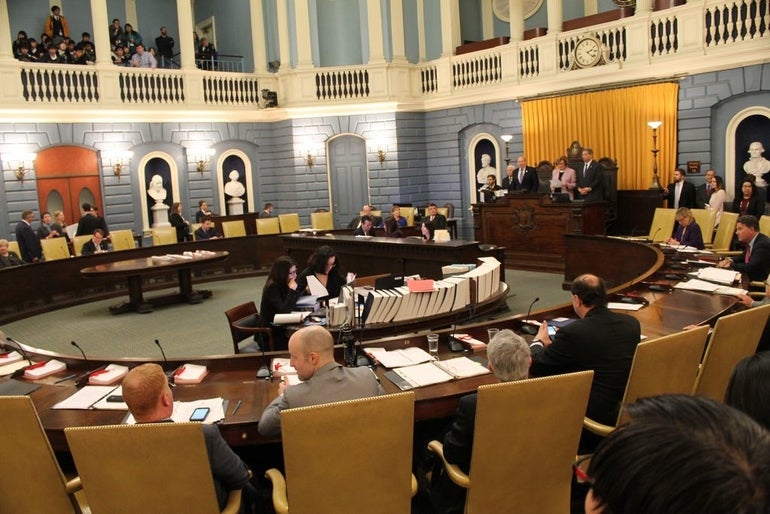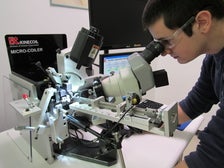Senate to advance family and medical leave bill
 Antonio Caban/SHNS
The Massachusetts Senate
Antonio Caban/SHNS
The Massachusetts Senate
The Senate on Tuesday teed up for debate bills dealing with human trafficking, family and medical leave, and drunk driving, setting the table for a rare Saturday session.
Saturday's session is sandwiched between the Republican and Democratic national conventions. The House and Senate are holding only informal sessions this week while a few House Republicans attend their party's convention in Cleveland and the Legislature is expected to do the same when Democrats attend their convention in Philadelphia next week.
Formal sessions will come to a close the weekend of July 30-31 and lawmakers are scurrying to advance major bills before the deadline.
Eligible employees would be eligible for up to 16 weeks of job-protected leave to recover from a significant illness or injury, or 26 weeks to care for a seriously ill family member or to care for a newborn child under a bill (H 4351) and Ways and Means Committee redraft (S 2446) placed on the agenda for Saturday's meeting.
Employees who have accrued at least 1,250 hours -- or roughly 31 40-hour work weeks -- of service to an employer would be eligible for the temporary leave. The bill would also require employers to restore an employee to their previous or "substantially similar" job upon returning from leave, according to a summary provided by the Senate Ways and Means Committee.
The temporary disability benefits would be equal to a percentage of the employee's average weekly wages, capped at $1,000 per week. The bill sets the percentages at 50 percent as of Jan. 1, 2018, 70 percent as of Jan. 1, 2019 and 90 percent as of Jan. 1, 2020.
The partial wage replacement benefits would be paid out of a Family and Employment Security Trust Fund that would be created by the bill, and would be administered by a new Division of Family and Medical Leave in the Executive Office of Labor and Workforce Development.
The bill would require employers to make contributions to the trust fund to secure benefits for their employees, though they may require an employee provide up to 50 percent of the required contribution.
The Associated Industries of Massachusetts has opposed paid family and medical leave legislation throughout the session, raising questions and concerns about costs to employers and to the state. An AIM official told the News Service on Tuesday the organization opposes the latest redraft of the bill.
The Senate on Saturday is also expected to consider a bill (S 1895) and a Ways and Means Committee redraft (S 2445) that would replace the availability of hardship licenses with the option to apply for an ignition interlock device for drunk driving offenders.
Ignition interlocks, devices that test the driver's blood alcohol content before the car will start, are currently required in Massachusetts for operators driving under a hardship license after two or more drunken driving convictions.
The interlock device would be an option for DUI offenders after serving some amount of a license suspension or other sentence. With each subsequent offense, the offender must complete a longer license revocation period before applying for the interlock device.
The bill as redrafted would also allow a person whose license has been suspended for failing or refusing a breathalyzer test to apply for an ignition interlock license.
The original bill (S 1895) would have required that an ignition interlock device be installed in the vehicles of all drunk driving offenders.
A Sen. Mark Montigny bill that aims to strengthen the state's anti-human trafficking law by creating a registration board and licensing process for bodywork therapists will also be before the full Senate this weekend. Merriam-Webster defines bodywork as "therapeutic touching or manipulation of the body by using specialized techniques."
The board established by the bill -- (S 872) and Rules Committee redraft (S 2444) -- would adopt regulations for the licensure of bodywork therapists, establish standards of conduct, investigate complaints and administer penalties, according to a bill summary provided by Montigny's office.
The bill calls for applicants seeking licensure as a bodywork therapist to be at least 18 years old, hold a high school diploma or equivalent, complete a course of at least 500 hours at an accredited institution, have "good moral character" as determined by the board and have no convictions for sexually-related crimes in the last 10 years.
Though the state already has a Board of Registration of Massage Therapy, bodywork is exempted from its requirements by statute.
There are more than 5,000 brothels disguised as massage or bodywork parlors in the United States, according to national anti-human trafficking organization Polaris Project, and the National Certification Board for Therapeutic Massage & Bodywork said it is working to draw attention to the issue.
"The fact is that many human traffickers are using our industry, the massage profession, as a front. In fact, it's one of the most popular 'covers' for human trafficking," the group wrote on its website. "That's why we feel compelled to take notice, take a stand, and take action."












0 Comments